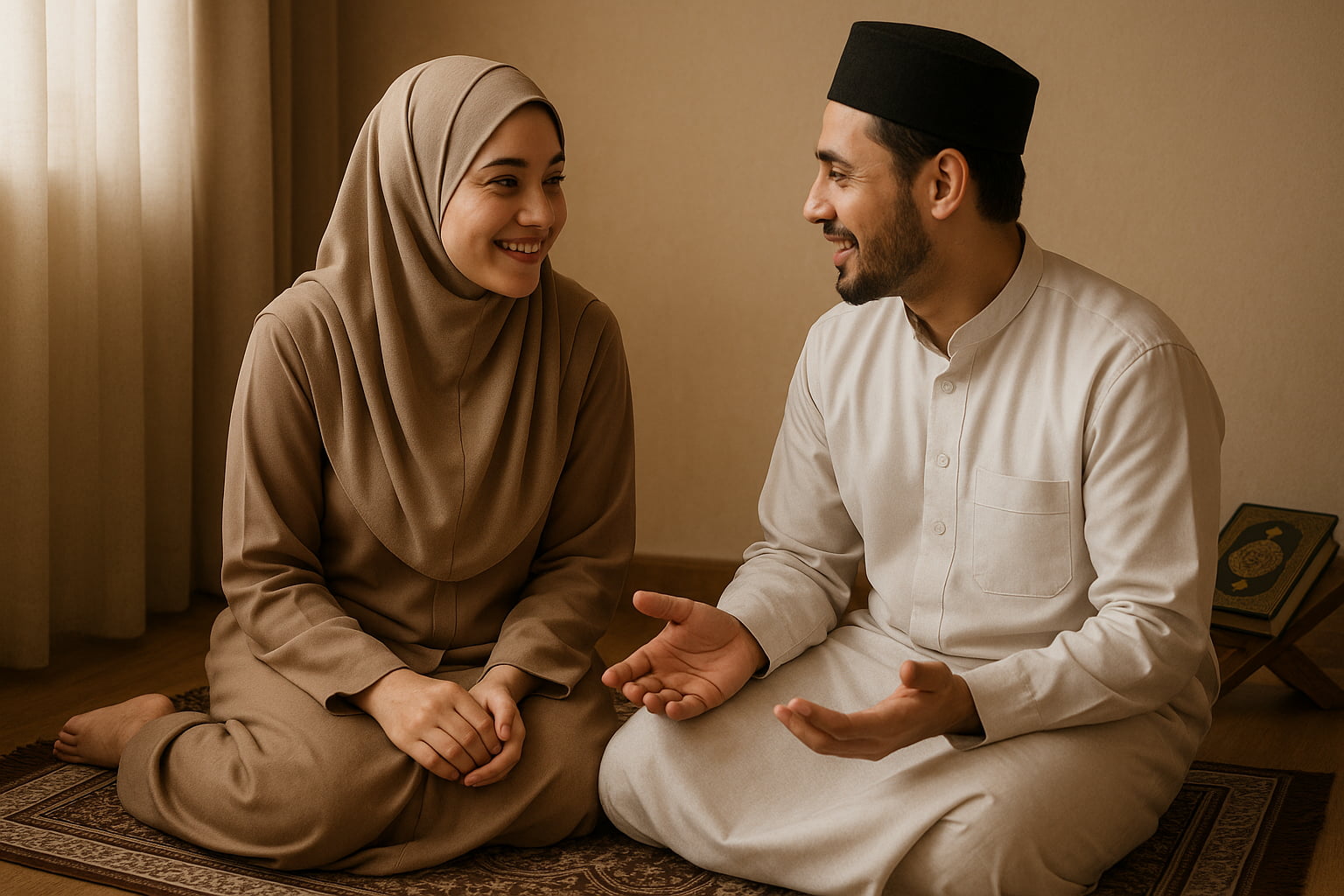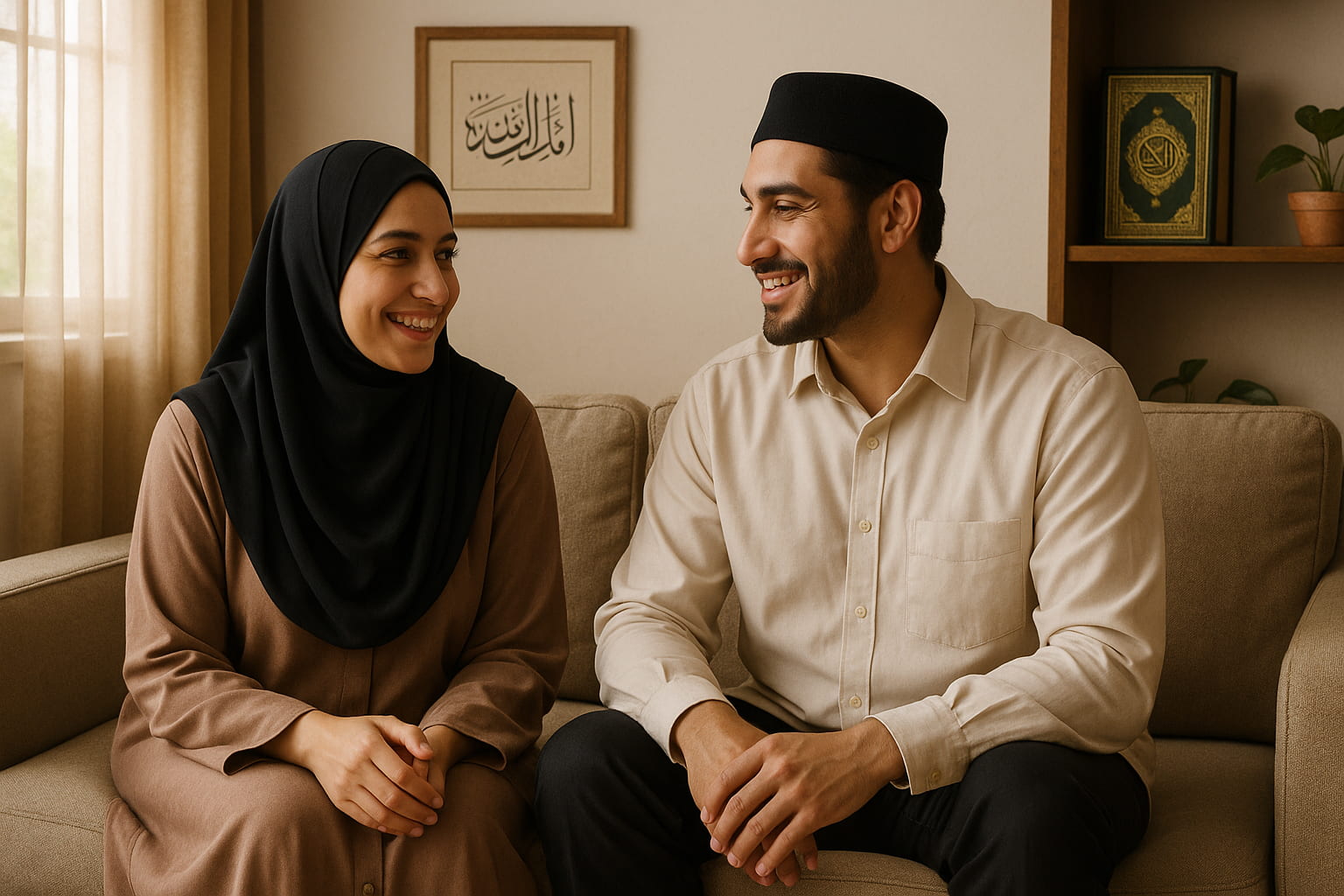Marriage in Islam is not just a contract; it is a deeply spiritual bond that requires effort, understanding, and mutual respect. At the heart of a strong Islamic marriage lies effective communication. How we speak with our spouses, the intention behind our words, and the tone we use all play vital roles in nurturing a loving and harmonious relationship.
This guide explores communication in marriage through the lens of Islam, offering insights from the Quran, hadith, and Islamic history. Whether you’re looking to deepen your connection with your husband or enhance the spiritual foundation of your marriage, you’ll find practical and faith-inspired advice here.
Why Is Communication Important in Marriage in Islam?
“They Are Your Garments”: The Quranic Perspective on Marriage
The Quran beautifully describes the husband-wife relationship as
هُنَّ لِبَاسٌۭ لَّكُمْ وَأَنتُمْ لِبَاسٌۭ لَّهُنَّ ۗ
(Surah Al-Baqarah, 2:187)English Translation:
“They are your garments and you are their garments.”
(Surah Al-Baqarah, 2:187)
This verse signifies closeness, protection, comfort, and a sense of being indispensable to each other. Communication is essential to uphold these qualities, fostering an atmosphere of mutual trust and love.
Emotional, Mental, and Spiritual Benefits
Open and compassionate communication helps both spouses feel understood, valued, and supported. It allows couples to address issues before they escalate, reducing misunderstandings and nurturing mental and emotional connection. On a spiritual level, healthy communication strengthens bonds that align with Islamic principles of kindness and compassion.
Family Harmony and Raising Peaceful Children
The family is the foundation of society, and when marital communication is healthy, it reflects positively on children and other family members. Children learn to emulate the respectful dynamics they witness at home, which contributes to raising individuals in a peaceful and loving environment. Parents who engage in kind and thoughtful dialogue will likely instill the same behavior in their children.
How Should a Wife Communicate with Her Husband?
Lessons from the Life of the Prophet Muhammad ﷺ and His Wives
The Prophet Muhammad ﷺ exemplified kindness, respect, and emotional intelligence in his interactions with his wives. He often listened to their concerns, valued their opinions, and encouraged open dialogue. For example, his wife Aisha (RA) famously narrated many hadith, reinforcing how he valued her knowledge and perspective. Modeling this type of respectful communication in your marriage can create a loving partnership.
Tone, Timing, and Intention
Islam teaches us to pay attention to not only what we say but also how we say it. A gentle tone, chosen words, and the right moment can make a world of difference in conveying your message effectively. Initiating conversations with the intention to build understanding, rather than to criticize, aligns with the Islamic principle of husn al-khuluq (good character).
The Prophet ﷺ advised, “The best of you are those who are best to their wives.” (Tirmidhi). This hadith underscores the importance of kindness in communication, setting an example for both husbands and wives.
How to Communicate with Your Husband in Islam?
1. Speak with Gentleness
The Quran advises speaking with gentle words, even when addressing adversaries.
فَقُولَا لَهُ قَوْلًۭا لَّيِّنًۭا لَّعَلَّهُۥ يَتَذَكَّرُ أَوْ يَخْشَىٰ
(Surah Taha, 20:44)English Translation:
“And speak to him mildly, that perhaps he may be reminded or fear Allah.”
(Surah Taha, 20:44)
If this applies to difficult situations, how much more important is it in marriage? Use calm and respectful language to express your thoughts and feelings.
2. Avoid Harsh Criticism
Harsh words can damage the trust and love between a husband and wife. Instead of focusing on faults, adopt a solution-oriented mindset. For instance, if an issue arises, frame it as an opportunity for teamwork rather than blame.
3. Listen Actively
Successful communication isn’t just about speaking; it’s also about listening. Give your husband the space to share his feelings without interruption. Active listening can often lead to mutual understanding and compromise.
4. Practice Sabr (Patience) and Hikmah (Wisdom)
Patience is a virtue at the core of Islamic teachings. Not every disagreement needs to be solved immediately. Sometimes, taking a step back to process emotions and think wisely can lead to better outcomes. Choose your battles wisely, and always prioritize peace over pride.
What Is the Best Conversation Between Husband and Wife?
The best conversations between a husband and wife are those that deepen their bond, nurture their love, and strengthen their understanding of one another. Start by discussing topics that promote connection, such as deen (faith) and its application in daily life. Whether it’s setting family goals, planning for your children’s future, or aligning your life with Islamic values, these discussions can bring you closer as a team.
It’s also important to talk openly about each other’s emotional needs. By expressing your feelings and listening with an open heart, you pave the way for a stronger emotional connection. Alongside meaningful discussions, don’t underestimate the value of light-hearted, playful exchanges. A smile, a joke, or a loving remark can brighten your spouse’s day and emulate the sunnah of our beloved Prophet Muhammad (ﷺ), who cherished loving and cheerful conversations with his wives.
How to Talk to Your Husband About Problems in Islam?
Islam places great emphasis on maintaining harmony and mutual respect within marital relationships, particularly when addressing problems. Following the Islamic etiquette of communication can help resolve issues effectively and strengthen your bond in the light of faith.
No Exposure or Gossiping
One of the most damaging actions in resolving conflicts is sharing personal marital issues with others or engaging in gossip. Islam warns against exposing someone’s faults, as it harms relationships and spreads discord. The Prophet Muhammad (ﷺ) said:
مَن سَتَرَ مُسْلِمًا سَتَرَهُ اللَّهُ فِي الدُّنْيَا وَالآخِرَةِ
(Sahih Muslim, Hadith 2580)“Whoever conceals the faults of a Muslim, Allah will conceal his faults in this world and on the Day of Resurrection.”
(Sahih Muslim, 2580)
Rather than seeking external validation or sympathy, focus on addressing issues internally with your spouse, with honesty and goodwill.
Importance of Timing, Privacy, and Humility
Approaching a conversation at the right time and place is critical. Timing can greatly affect how the message is received. Avoid discussing problems when your spouse is tired, stressed, or distracted. Choose a private, calm setting and approach the conversation with humility, leaving behind anger or blame.
Allah (SWT) advises patience and humility in every matter:
فَقُولَا لَهُ قَوْلًا لَّيِّنًا لَّعَلَّهُۥ يَتَذَكَّرُ أَوْ يَخْشَىٰ
(Surah Ṭāhā, 20:44)“…and speak to him with gentle speech that perhaps he may be reminded or fear [Allah].”
This reminder highlights the importance of delivering naseeha (advice) in a kind and respectful manner.
Use of Naseeha (Advice) with Love and Good Intention
Naseeha, or sincere advice, is a core principle in Islam and especially significant within a marriage. When addressing problems, ensure the intention behind your words is not to criticize but to nurture and guide with love. The Prophet Muhammad (ﷺ) has said:
الدِّينُ النَّصِيحَةُ
قُلْنَا: لِمَنْ؟
قَالَ: لِلَّهِ، وَلِكِتَابِهِ، وَلِرَسُولِهِ، وَلِأَئِمَّةِ الْمُسْلِمِينَ، وَعَامَّتِهِمْ
(Sahih Muslim, Hadith 55)
“The religion is sincere advice (naseeha).”
We said, “To whom?”
He said:
“To Allah, His Book, His Messenger, the leaders of the Muslims, and their common folk.”
(Sahih Muslim, 55)
By offering advice with a sincere heart and good intentions, you create a path for resolution and mutual understanding. Always remember that your tone and choice of words carry immense weight in how your message will be perceived.
Maintaining respect, empathy, and a commitment to Islamic principles not only resolves conflicts but strengthens the bond between spouses, allowing love and tranquility to flourish as intended by Allah (SWT).
How to Talk Respectfully to Your Husband
Mutual Respect in Marriage
Respect is a two-way street in marriage. Islam emphasizes that both husbands and wives are to honor and respect one another. The Prophet ﷺ said, “Believers with the most complete faith are those with the best manners. And the best of you are those who are best to their wives.” (Tirmidhi). Mutual respect begins with the way we communicate.
How Can I Improve Communication with My Husband in Islam?
Make Dua for Understanding and Harmony
Dua is a powerful tool that connects us directly to Allah (SWT). If you face challenges in communication or feel there is a gap, ask Allah (SWT) for help and guidance in achieving understanding and harmony within your marriage. The Quran says, “And your Lord says, ‘Call upon Me; I will respond to you.'” (Quran 40:60). Remember to sincerely make dua, not just for yourself but also for your husband, asking Allah to fill your relationship with peace and mutual understanding.
Implementing Daily Check-Ins or Meaningful Talk Time
Setting aside time daily to check in with each other can significantly strengthen your bond. Whether it’s a brief conversation about your day or a deeper discussion about your feelings and concerns, consistent communication fosters connection. The Prophet ﷺ would often engage with his family and encourage open communication. Aisha (RA) said, “The Messenger of Allah ﷺ used to talk to us and joke with us.” We can learn from his example by making time for meaningful moments with our spouse.
Learning from the Prophet’s ﷺ Communication Style
The Prophet ﷺ exemplified the best manners in all his interactions, including how he communicated with his wives. He was kind, patient, and understanding when addressing them. One example is when he said, “The best of you are those who are best to their wives.” (Tirmidhi). Following his sunnah means speaking with kindness, listening attentively, and addressing your spouse’s concerns with gentleness. The Quran further reminds us to, “Speak to people good words…” (Quran 2:83), and certainly, this applies most to our spouse.
Seeking Islamic Counseling if Needed
Sometimes, challenges in communication may require external support, and seeking Islamic counseling can be immensely beneficial. Counseling founded on Islamic principles provides guidance rooted in the Quran and Sunnah, ensuring solutions align with our faith. The Quran reminds us,
وَإِنْ خِفْتُمْ شِقَاقَ بَيْنِهِمَا فَٱبْعَثُوا۟ حَكَمًۭا مِّنْ أَهْلِهِۦ وَحَكَمًۭا مِّنْ أَهْلِهَآ ۚ إِن يُرِيدَآ إِصْلَـٰحًۭا يُوَفِّقِ ٱللَّهُ بَيْنَهُمَآ ۗ إِنَّ ٱللَّهَ كَانَ عَلِيمًا خَبِيرًۭا
(Surah An-Nisa, 4:35)“And if you fear dissension between the two, send an arbitrator from his people and an arbitrator from her people. If they both desire reconciliation, Allah will cause it between them. Indeed, Allah is ever Knowing and Acquainted [with all things].”
(Qur’an, Surah An-Nisa, 4:35)
Seeking help is not a sign of weakness but rather a step toward improving and strengthening your relationship.
By incorporating these teachings and strategies, communication in your marriage can become a means of earning Allah’s pleasure while fostering love and harmony in your home.
Examples of Respectful Speech from Islamic History
Stories from Islamic history show us how respectful speech strengthens bonds. Umm Salama (RA), one of the Prophet’s ﷺ wives, often provided sound counsel during situations that required wisdom. Her respectful approach and her husband’s recognition of her intelligence highlight the harmony that comes from mutual respect.
Avoid Sarcasm, Shouting, and Belittling Behavior
Islam discourages any form of speech that degrades or insults another person. Words have power; use them to uplift your spouse rather than to tear them down. Shouting or sarcasm can create emotional distance, while modest and kind words nurture closeness.
How to Please Your Husband Islamically?
Fostering a loving and harmonious relationship with your husband rooted in Islamic principles can bring immense spiritual rewards and strengthen your bond as a couple.
The Rewards Promised for Kind Treatment of the Husband
Islam emphasizes the importance of kindness and good conduct within a marriage. Treating your husband with love and respect is not only a way to fulfill your marital duties but also an act of worship that earns immense rewards in the hereafter. The Prophet Muhammad (peace be upon him) highlighted the value of a wife’s good treatment toward her husband, promising that such behavior would bring blessings and favor with Allah. Upholding patience, offering support, and maintaining a pleasing demeanor can transform your relationship into a source of tranquility and reward.
Balancing Communication with Service, Kindness, and Emotional Support
A successful Islamic marriage thrives on balance. Not only is clear and open communication vital, but so is demonstrating acts of service, showing kindness, and offering emotional support. Listen attentively when your husband shares his thoughts, and offer encouragement when he needs it. Balance these aspects by being considerate of his needs and ensuring that your home remains a place of peace and comfort. Through respectful dialogue and acts of generosity, you create an environment that nurtures love and understanding.
Simple Ways to Show Love and Attention Through Words and Actions
Even small gestures can go a long way in making a husband feel valued and appreciated. Express gratitude verbally for his efforts, as “thank you” can carry immense weight. Engage in thoughtful acts such as preparing a favorite meal, leaving a kind note, or offering a heartfelt compliment. Physical affection, like a warm smile or a reassuring touch, can also strengthen emotional bonds. Consistency in these loving gestures fosters a connection that is both deep and enduring, reflecting the beauty of an Islamic marriage.
Building a Foundation of Love and Understanding
Effective communication is one of the pillars of a thriving Islamic marriage. By understanding the importance of gentle speech, listening actively, and practicing sabr and hikmah, you can strengthen your relationship in ways that align with both your emotional needs and Islamic principles.
Remember that marriage is a partnership where both husband and wife have roles in maintaining harmony. By striving to communicate better, you not only nurture love and mutual respect but also strengthen your spiritual bond as partners in faith.









